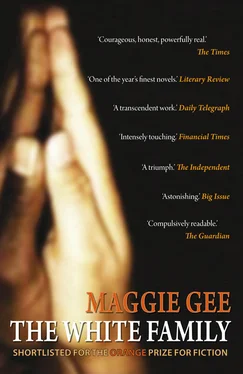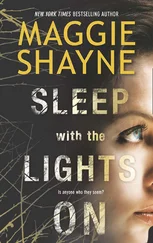Dirk was so much slower than the other two kids. Not tall like Darren, nor good-looking like Shirley. He was skinny, painfully so. And he’d inherited Alfred’s great beak of a nose — a nose of pride, of character, May tried to tell Dirk when he was thirteen and she caught him crying in his bedroom mirror — together with a bony jaw that had suddenly grown heavier in his late teens. Between the two outcrops, his mouth seemed to shrink.
For years they told themselves there was a temporary blockage. They had flashes of hope; he could add up in a trice, could price a load of shopping before she reached the till. But his English essays were short and abysmal. ‘No imagination,’ the teacher had said. ‘His basic trouble is no imagination.’ She hoped he was wrong. Dirk just lacked words. But there came a time when you had to give up.
He did have nice hair. Unusual hair. Hair like May’s when she was a girl. (May had been grey for thirty years, though until she was sixty she always dyed it, and Alfred, bless him, never knew. Even in marriage, there had to be secrets.)
Mr Punch. That was her youngest son . She made herself face it, finally. Overshot, underhung. And that shining blond head made folks look at him, which wasn’t a kindness when you weren’t a film star.
Shirley had always been kind to Dirk, and he had hero-worshipped his sister, saved his pocket-money to buy her sweets, which he ate himself, but the thought was there.
It was over now. They weren’t close any more.
He just couldn’t stomach her marrying Kojo.
‘She can’t love him. You’ve seen him, haven’t you. I mean, he’s not half-caste, or something like that. He’s black as black. He’s a fucking gorilla.’
‘I saw him,’ said May, coolly, calmly. ‘He’s a human being like anyone else. I talked to him. And I quite liked him.’
‘You crept around him,’ said Dirk, disgusted. ‘You acted like he was the bee’s knees.’
May wouldn’t let him get away with that. ‘I’m polite to everyone who comes to this house,’ she said, turning to look him in the eye, putting down her tea-cloth, drawing herself up. ‘You mind your manners with your sister’s friends, while you’re still living under our roof.’
She rarely spoke to him like that. She was the angrier because he had expressed her own feelings, the ones she had almost completely suppressed — why did Shirley have to go the whole hog? Did she have to choose one as black as that?
Dirk never discussed it with Shirley. Instead, he withdrew from her altogether. The women retreated to a knot in the kitchen whenever they wanted to talk about the wedding, planning the guest list, dreaming of the cake.
‘We can pay up to two thousand pounds,’ May had said, hot with fear as she spoke the words. Spinning noughts, whirling, disappearing … It was her own money, a savings plan she had put aside for over twenty years, cheating on the housekeeping, stinting herself.
But Shirley said, ‘Don’t be silly. Kojo wouldn’t dream of accepting any money. His family were paramount chiefs, in Ghana. He’s going to pay for everything, including a new outfit for you, if you want one. You could do with one. You know you could.’
On the day Dirk turned up at the very last moment, wearing a dark jacket he had borrowed from someone, not the sort of jacket that teenagers wore, and a bright pink tie, entirely surprising. He looked almost handsome, with his yellow-white hair, but he spoke to no one, stood open-eyed and furious throughout the ceremony, never kneeling down to pray, then afterwards retreated to a corner of the beautiful apricot hotel lounge and sat with his father, backs to the wall, drinking beer, not wine, and refusing to eat. They wove away together at the very end, self-righteous and sullen, looking neither left nor right, as if they alone had behaved irreproachably, as if they had won a great victory, between them.
Yet only a year after the wedding, Dirk had started going round to Shirley and Kojo’s house. When Shirley told her mother, May couldn’t believe it. ‘He’s not coming round to make trouble, is he? His dad’s put some strange ideas in his head.’
‘He said he missed me,’ Shirley told her. ‘I don’t mind. Forgive and forget. He’s found out Kojo likes football too.’
And so they had seemed to get over it, and be close again, like when they were children. Dirk didn’t know what to say to Kojo after they had totted up the football scores, so he told him the plot of television films he’d seen, and Kojo sat and nodded, patiently, though he hardly ever watched TV.
Then Kojo got ill with lung cancer and Dirk was nearly as upset as May. He had kept his sister company when things were bad. He visited right up to the end. The night Kojo died and the phone call came he sat in May’s kitchen, shaking his head, and after the funeral he went home with Shirley.
But eighteen months later she took up with Elroy, and to May’s astonishment they started again, Dirk and his father, as if they’d learned nothing.
‘Kojo was different,’ Dirk insisted. ‘Kojo wasn’t like the others. You know he wasn’t. You liked him too.’
‘Yes,’ said May. ‘But —’
‘I don’t want to talk about it,’ Dirk said, head down. His new blond crewcut stared her in the face.
And that was that. May had tried to understand it. People kept things in their brains in tight little boxes … Because Dirk like Kojo, Kojo stopped being black. And so Dirk could go right on hating blackness.
Dirk wouldn’t talk to Shirley, either. ‘I can’t understand him,’ Shirley said. He hadn’t talked to her, except to say ‘Hello’, for years. Which was a sadness to May and Alfred, who had always liked the two kids being close, and hoped it might last them all their lives, so the family wouldn’t end with the parents.
But things didn’t last. Why hadn’t she realized? The years like water washed them away, the things of beauty, the things you loved, dipping and glinting away into the distance. The only constants were bills, and getting older, and the pain in her knees, and the ache in her neck.
And the house, the bloomin’ house where they’d lived forever. With its creaks, and its knockings, and its leaky gutters –
And its whitewashed front in the morning sun. And the smell of apples from the fruit-bowl in the living-room. And that dot of gold dancing about off the mirror. He would catch it on one finger, on his free afternoon, and point at her like a magician. His chair, her chair. With Shirley’s cushions, easing their bones as they sank down. Their little house, with its steamy kitchen, smelling of washing and hot Ribena. Its warmth, its sheen, its — familiarness. Was that the word? Their family home.
Alfred, pet.
She would take him home.
‘Here’s Dirk,’ said Alfred abruptly. ‘Look.’
You couldn’t miss him. That ash-white hair, and something jerky about his walk, as if he was head-butting a low brick wall. As if this habit had injured his brain … Dirk hadn’t had an easy time in life.
‘I wonder if he met his sister on the stairs.’
As he got nearer, you could see the boy was small. His head slightly bowed, he nodded on forward, blinking and grinning, glad to see his father.
May thought, he almost worships his father.
‘Is that your boy?’ It was a woman’s voice. May turned to look at her, surprised. The body in the next bed was female. She was sixty-ish — maybe seventy-ish — with a plump red face, powdered in patches, and a swatch of red hair pulled back in a bun. Alfred must have been encouraging her . May didn’t approve of these mixed wards.
Alfred had pulled himself virtually erect (he’s certainly thinner — they aren’t feeding him) and was grinning at the woman, a mask on a stick — if he knew what he looked like he wouldn’t do it. ‘No, this is Dirk.’
Читать дальше












